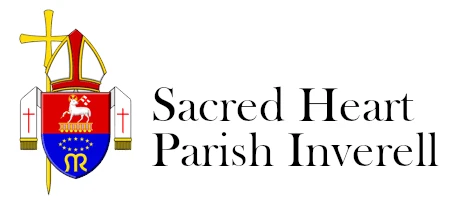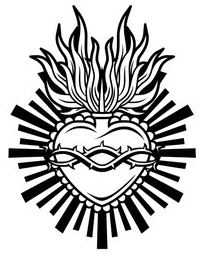Divine Mercy Sunday - 16 April
14th April 2023

Divine Mercy Sunday - 16 April
“Confession heals, confession justifies, confession grants pardon of sin. All hope consists in confession. In confession there is a chance for mercy. Believe it firmly. Do not doubt, do not hesitate, never despair of the mercy of God. Hope and have confidence in confession.” - St Isidore of Seville
Sacred Heart Parish Inverell's Divine Mercy Sunday Schedule is as follows:
8.00am-8.30am - Confession
9.00am - Holy Mass
2.00pm - Confession
2.30pm - Exposition of the Blessed Sacrament
2.45pm - Litany of Divine Mercy
3.00pm - Chaplet of Divine Mercy
3.15pm - Benediction
A reflection on today's Gospel by the Venerable Archbishop Fulton J Sheen:
"The place where the disciples were assembled that Easter Sunday evening was the Upper Room; where Our Lord gave the twelve the Eucharist, only seventy-two hours before. Added to the doubts of the disciples was fear which prompted them to close the doors and to bolt them, lest the representatives of the Sanhedrin break in to arrest them on the false charge of stealing the Body. There was also a dread that possibly the people might storm, as they often did, the house of those who were unpopular. Though the doors were shut, suddenly in the midst of them appeared the Risen Lord, greeting them with the words: ‘Peace be upon you’ (Luke 24:36). He bade the women at the grave, who were plunged in grief, to rejoice; but now, having brought about peace by the Blood of the Cross, He came in His own Person to bestow it.
"Three times after His Resurrection, He gave the solemn benediction of peace. The first was while the Apostles were terrified and frightened; the second, after He gave proof of His Resurrection; and the third, a week later when Thomas was with them.
"He showed them His hands and His feet, which had been pierced with nails on the Cross, then His side, which had been opened with a lance, saying to them: ‘Touch Me, and look; a Spirit has not flesh and bones, as you see that I have’ (Luke 24:39). These nail prints, this pierced side, these were the unmistakable scars of battle against sin and evil. As many a soldier looks upon the wounds he received in battle not as a disfigurement, but as a trophy of honour, so [Christ] wore His wounds to prove that love was stronger than death.
"After having proved to His disciples that He had risen by showing them His hands, feet, and side, and by eating before them, He gave to them the second salutation of peace (John 20:21). The first salutation of peace was when they were frightened; now that they were filled with the joy of believing, the second salutation of peace had reference to the world. His concern was not with the world of His public life, but the whole world He had redeemed.
"The night of the Last Supper before going to His death, He was concerned about His mission to the world after His Crucifixion—a mission into a world that had rejected Him. Now, after the Resurrection, He reiterated the same idea to His Apostles. His mission and their mission was one. As Christ was sent and through His suffering entered into glory, so now He bequeathed to them His share of the Cross and, after that, His glory.
"Our Lord did not say, ‘As My Father sent Me so also I send you,’ because there are two entirely different Greek words used in the original for “sent.” The first word was used to describe both Our Lord’s mission from the Father and the mission of the Holy Spirit; the second word implied rather a commission, and had reference to Christ’s authority as an ambassador. Christ came forth from the eternal bosom of the Father in His Incarnation; so now the Apostles would go forth from Him. Just as Our Lord had insisted on the difference between ‘My Father’ and ‘Your Father’ so now He stressed the difference between the respective missions. Christ was sent to manifest the Father because He was one in nature with the Father; the Apostles, who were the foundation stones of the Kingdom, were to manifest the Son. As He spoke these words they could see the glorious scars on His risen Body. Imprinting them on their mind, they understood that as the Father had sent Him to suffer in order to save mankind, so the Son was sending them to suffer persecution. As the love of the Father was in Him, so the love of the Father and Himself would be in them. The authority behind the apostolic mission was overwhelming; for its roots were in the analogy of the Father sending His Son and of the Son sending them. It was no wonder that He told them that whoever would reject one of His Apostles would be rejecting Him. Though Thomas was not there, he nevertheless would partake of the gifts, even as St. Paul did.
"Then Our Lord breathed on them as He conferred some power of the Holy Spirit. When love is deep, it is always speechless or wordless; God’s love is so deep that it can be expressed humanly by a sigh or a breath. As He has breathed into Adam the breath of natural life, so now He breathed into His Apostles, the foundation of His Church, the breath of spiritual life. As man became the image of God in virtue of the soul that was breathed into him, so now they became the image of Christ as the power of the Spirit was breathed into them. The Greek word used to express His breathing on them is employed nowhere else in the New Testament; but it is the very word which the Greek translators of the Hebrew used to describe God’s breathing a living soul into Adam. Thus there was a new creation as the first fruit of the Redemption.
"As He breathed on them, He gave them the Holy Spirit, which made them no longer servants, but sons. Three times the Holy Spirit is mentioned with some external sign; as a dove at Christ’s baptism betokening His innocence and Divine Sonship; as fiery tongues on the day of Pentecost as a sign of the Spirit’s power to convert the world; and as the breath of the Risen Christ with all of its regenerative power.
"Next He conferred upon them the power of forgiving sins. There was even to be a distinction between sins that the Apostles would forgive and sins they would not forgive. How they would distinguish between the two would evidently depend on hearing them. He said: ‘When you forgive men’s sins, they are forgiven, when you hold them bound, they are held bound’ (John 20:23). As the Jewish priest pronounced who were clean and who were unclean among the lepers, so now Christ conferred the power of forgiving and withholding forgiveness on sinners. Only God can forgive sins; but God in the form of man forgave the sins of Magdalen, of the penitent thief, of the dishonest tax collector, and of others. The same law of the Incarnation would now hold; God would continue to forgive sins through man. His appointed ministers were to be the instruments of His forgiveness, as His own human nature was the instrument of His Divinity in purchasing forgiveness. These solemn words of the Risen Saviour meant that sins were to be forgiven through a judicial power authorised to examine the state of a soul and to grant or refuse forgiveness as the case demanded. From that day on, the remedy for human sin and guilt was to be a humble confession to one having authority to forgive. To be humble on one’s knees confessing to one to whom Christ gave the power to forgive (rather than prostrate on a couch to hear guilt explained away)—that was one of the greatest joys given to the burdened soul of man." (Life of Christ)
Prayer of Repentance
I beseech Thee, O Most Blessed Trinity, to shed the fire of Thy merciful love upon this most frigid heart, to let shine upon this most darkened mind, the light of the Son, in Whom alone is every grace and truth. Have pity on me, most Merciful God, and regard not my sins and offences, but in Thy mercy forgive me yet again, and grant me the graces to serve Thee now in fidelity and truth. Amen. 💖💐🙏
Food for thought
When her children are dirty, a mother will clean them so they are fresh once again, free of all stains. In our spiritual life, we, when our souls are stained with sin, go to Holy Mother Church to be cleansed. In the sacrament of penance, the cleansing mercy of Christ wipes away all defilement. And just as a mother will clean her children an infinite amount of times, so too does Holy Mother Church extend an endless opportunity for us to receive the purifying grace of Christ’s mercy.


